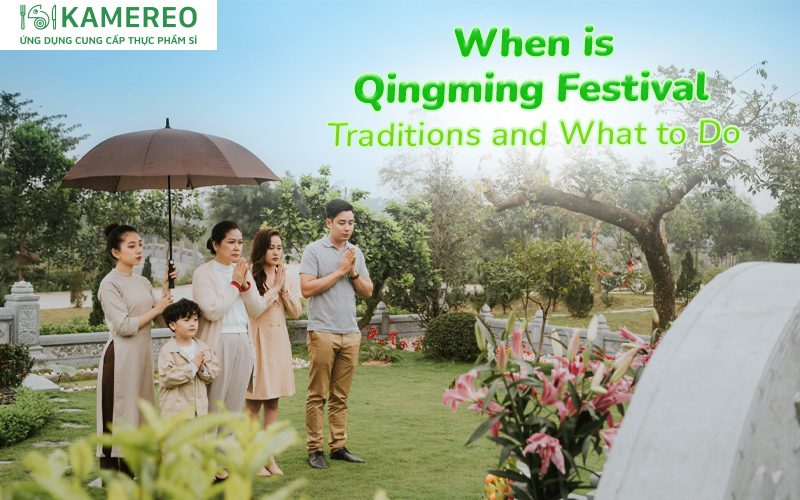Qingming Festival is a traditional holiday that embodies the Vietnamese principle of “drinking water, remembering its source.” It is a time for descendants to pay respects to their ancestors by cleaning their graves, offering incense, and strengthening family bonds. In 2025, Qingming Festival falls on Friday, April 4, 2025, which corresponds to the 7th day of the 3rd lunar month, marking the transition to a fresh and clear season. Continue reading with Kamereo to learn more about the origins, significance, and preparations needed for tomb-sweeping day.
When is Qingming Festival 2025 in the Gregorian calendar?
Qingming Festival 2025 falls on Friday, April 4, 2025, in the Gregorian calendar, which corresponds to the 7th day of the 3rd lunar month. This is the first day of the Qingming solar term – the beginning of a period of fresh and warm weather, often chosen by the Vietnamese to perform tomb-sweeping rituals and honor their ancestors.
The Qingming solar term typically lasts from April 4 to April 20 each year. In 2025, the Qingming solar term starts on April 4, 2025, and ends on April 19, 2025 in the Gregorian calendar. Thus, the Qingming Festival period will last for 15 days, with April 4 being the day of the Qingming Festival – the most sacred and solemn time for descendants to carry out ancestral rites according to traditional customs.
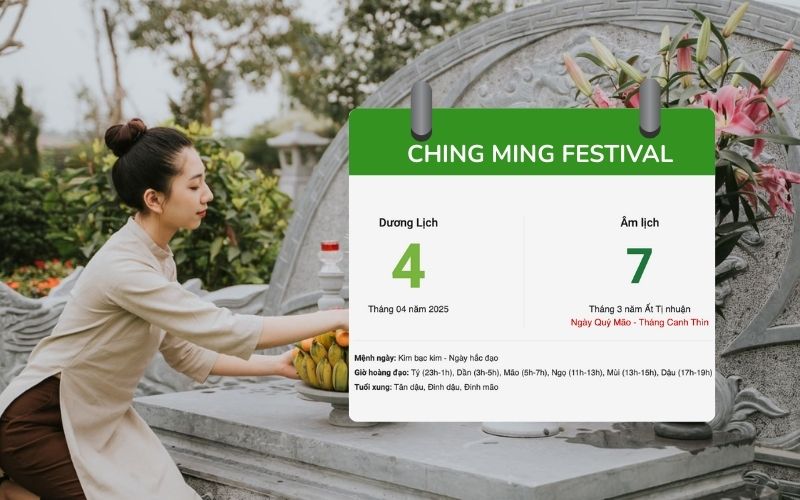
Origins and Significance of Qingming Festival
Origin of Qingming Festival
The Qingming Festival has its roots in the ancient agricultural culture of Eastern countries, particularly China. In the traditional “twenty-four solar terms” system, which is based on the lunar calendar, Qingming is the fifth solar term of the year. It occurs about 15 days after the Spring Equinox, when the weather gradually transitions to real spring. The skies clear up, the air becomes mild, and plants begin to bud, signaling the approach of a new farming season.
From a semantic perspective, “Qing” means clear or pure, and “Ming” means bright or clear. “Qingming” can be understood as a time when the sky is bright and clear, and the weather is cool and refreshing – ideal conditions for performing rituals that connect heaven, earth, and humanity. It is during this period that people in ancient times selected the first day of the Qingming solar term as an opportunity to show filial respect to their ancestors by cleaning their graves, offering incense, and gathering together as a family.
According to historical records, the tomb-sweeping ceremony during the Qingming Festival originates from the ancient Chinese custom associated with the “Treading on Green” festival. During this festival, people not only remembered the deceased but also participated in outdoor activities, such as walking on grass and enjoying the spring scenery. Over time, this custom spread to Vietnam, where it was adapted to fit local cultural practices. Today, it has become one of the most meaningful holidays, reflecting the deep humanitarian spirit of the Vietnamese people, emphasizing the core value of “drinking water, remembering its source.”
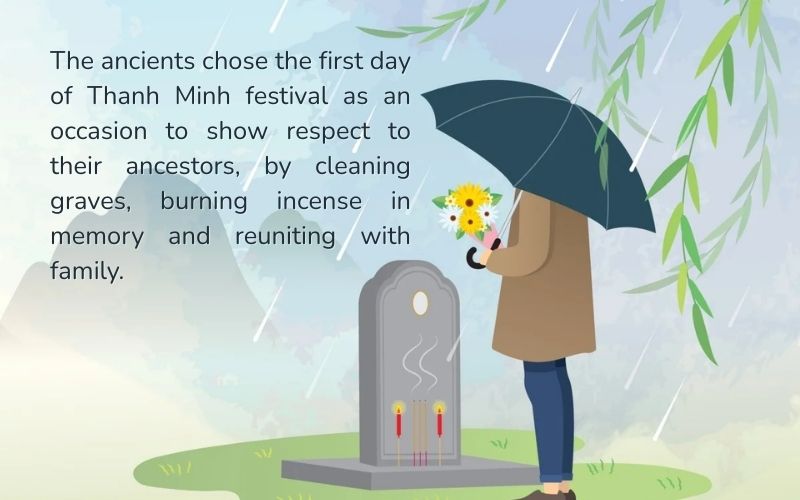
Significance of Qingming Festival
Qingming is not only a climatic milestone of the year but also holds profound spiritual significance, reflecting the strong bond between humans, ancestors, family, and nature. It is an occasion for each Vietnamese person to pause in the hustle and bustle of life, reflect on their roots, and demonstrate the principle of “drinking water, remembering its source, and remembering those who planted the trees” – one of the fundamental values that form the foundation of Vietnamese culture.
In the hearts of the Vietnamese people, Qingming Festival is a day when descendants return to their homeland, clean the graves of their ancestors, offer incense, flowers, and other offerings, and express their gratitude to their ancestors. The burning incense and the handful of earth placed on the graves are not only ceremonial acts but also serve as an invisible bond between generations – strengthening family unity and connecting emotions in a solemn and respectful manner.
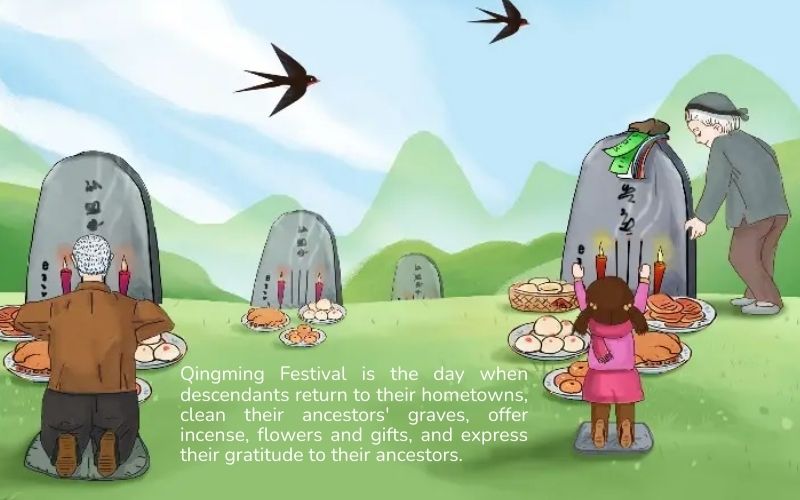
What to Prepare for Tomb-Sweeping during Qingming Festival
Offering Table for the Ceremony
During the Qingming Festival, preparing a well-arranged offering table to place at the ancestor’s grave is an important ritual, symbolizing the respect and gratitude that descendants have for those who have passed. The offering table doesn’t need to be overly elaborate but should be complete, thoughtful, and in accordance with the customs of each family or region.
Below are the basic items that should be included in the Qingming offering table:
- Incense: This is essential in any spiritual ritual. Lighting incense represents communication between the realms of the living and the deceased, serving as a way for descendants to express their reverence for their ancestors.
- Fresh Flowers: Usually, chrysanthemums, lilies, gladiolus, or any flower that the deceased liked. Flowers symbolize purity and deep remembrance.
- Fruits: Comprising five types of fresh, beautiful fruits with harmonious colors, symbolizing the five elements and prosperity. The most common fruits are bananas, pomelos, oranges, apples, and pears, depending on the season and region.
- Sweets and Sticky Rice or Porridge (Bánh kẹo – xôi chè): These traditional foods are ceremonial offerings. The family may prepare bánh chưng, bánh giầy, sweet porridge, or other simple snacks that show care and thoughtfulness.
- Rice and Salt: Rice symbolizes abundance, and salt is believed to ward off evil and bring peace. These items are usually scattered around the grave after the offering ceremony.
- Wine, Tea, and Clean Water: Poured into small cups and offered at the grave. Wine and tea symbolize filial piety, and clean water represents purity and serenity.
- Joss Paper and Paper Goods: This includes gold paper money, paper clothes, and even replicas of everyday items to “send” to the deceased.
- Betel and Areca Nut: Representing respect and thoroughness in traditional rituals. Betel and areca nuts are often offered along with tea or wine on the offering table.
- Candles or Oil Lamps: These are lit at the grave to not only perform the ritual but also to create a solemn atmosphere, especially if the tomb-sweeping is done early in the morning or late in the evening.
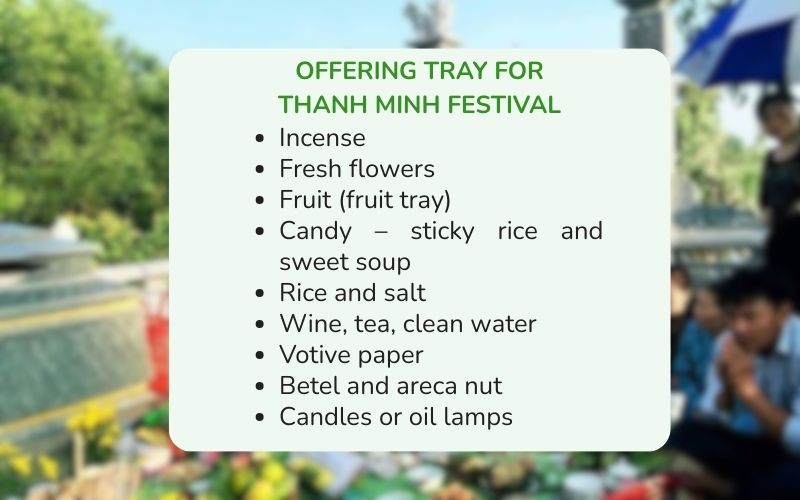
The offering table should be arranged neatly and cleanly, usually placed on a mat or clean cloth in front of the grave. After setting up the offerings, the head of the family will light incense and recite a prayer, inviting the ancestors to come and partake in the offerings, while also asking permission to clean and repair the grave. The tomb-sweeping ceremony concludes when the incense has burned about two-thirds of the way. At this point, joss paper can be burned, blessings can be sought, and the offerings should be collected and tidied up properly.
Cleaning Tools for Tomb-Sweeping
The most important aspect of this ritual is not the richness of the offerings but the sincerity, respect, and connection that descendants demonstrate towards their roots. A simple yet carefully prepared offering, done at the right time and in the proper manner, holds much deeper spiritual value than any extravagant display.
Preparing the necessary tools for cleaning the grave properly reflects the care and respect towards the deceased:
- Soft Broom or Small Bamboo Broom: Used to sweep fallen leaves, dust, and weeds covering the grave. The broom should be compact and easy to use, avoiding scratches on the gravestone.
- Small Shovel or Trowel: Useful for scooping soil and adding it to areas around the grave that have settled.
- Grass Cutter: Helps trim the grass growing around the grave.
- Clean Cloth: Used to wipe the gravestone, lampstands, incense holders, or any surfaces that have accumulated dust. You may also bring dry and wet tissues for convenience.
- Gloves: Protects hands from dirt, debris, or contact with dry grass and broken stones.
- Bucket or Basin: Used to carry water, soil, or collect trash during the cleaning process. If working in a group, it’s helpful to bring a large plastic bag for collecting the trash.
- Clean Water: Used to wash the gravestone or lightly water the area around the grave after cleaning.
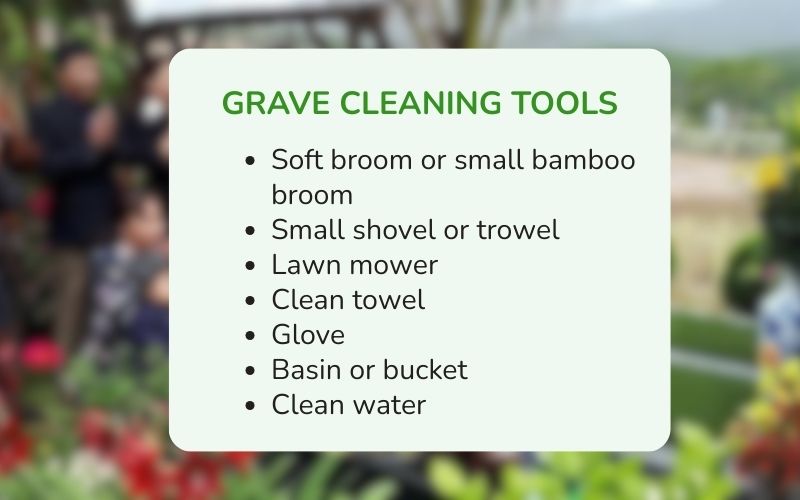
Carefully preparing these items not only ensures the grave is cleaned efficiently but also demonstrates thoroughness in performing the ritual, showing the descendants’ filial piety and respect for their ancestors.
Qingming Festival Prayer
Qingming Festival Prayer at the Grave
Namo Amitabha Buddha!
Namo Amitabha Buddha!
Namo Amitabha Buddha!
I bow to the nine directions of the sky, to the ten directions of the Buddhas, to the Buddhas of the ten directions.
I respectfully bow to the spirit of …………. (Ancestor’s name, or Paternal or Maternal Ancestor).
Today is the day ………..
On the occasion of …………
The humble devotee (we) ………
Residing at: ……….
We, along with our entire family, express our gratitude for the great kindness and the deep virtue of ………, and we feel deeply moved as we think of the resting place, often neglected, in a desolate spot. The humble devotee has prepared offerings, betel leaves, areca nuts, flowers, fruits, and incense, respectfully presenting them at the grave, and humbly invite the spirit of ………… to return and receive the offerings.
We humbly seek permission to repair the grave, add soil, and reinforce the tombstone to ensure it remains strong. We ask for the protection of Buddha and the saints, the protection of the heavens and earth, and the blessings of the spirits, so that we may receive peace, and our ancestors’ spirits may rest in peace while our living family is blessed with prosperity and happiness.
We, the descendants, vow to accumulate merit and virtue, making offerings of love, help for the poor, support for widows and orphans, and respect for our elders. We dedicate these merits to our ancestors.
We humbly ask the sacred spirits to witness our offerings, bless and protect our family, examine and guard our home, protect us from disasters, bestow wealth and good fortune, bring good things, and dispel misfortunes. May the family prosper, the descendants thrive, and may we receive blessings from heaven.
We offer this humble prayer with sincere devotion, and humbly ask for your blessings.
After the prayer, wait until about two-thirds of the incense has burned, then proceed to thank the spirits, burn joss paper, ask for blessings, and return home to conduct a ceremony for the house gods and ancestors at home.
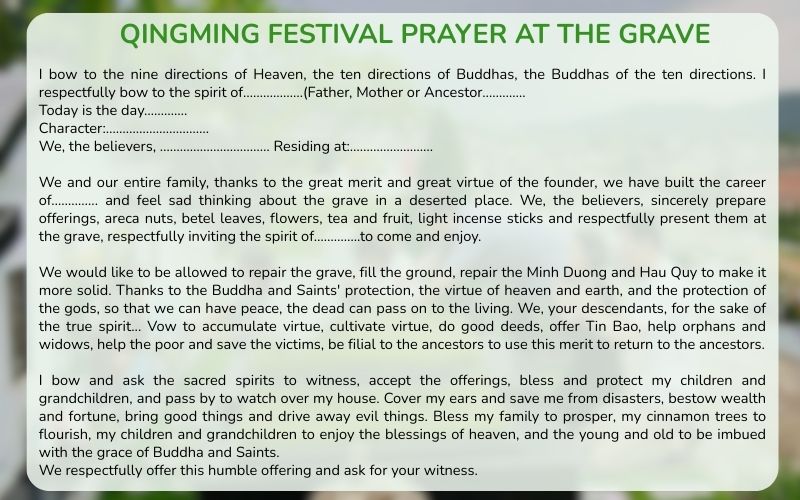
Qingming Festival Prayer at Home
Namo Amitabha Buddha!
Namo Amitabha Buddha!
Namo Amitabha Buddha!
I bow to the nine directions of the sky, to the ten directions of the Buddhas, to the Buddhas of the ten directions.
I bow to our ancestors, both paternal and maternal, from both sides of the family.
I bow to the spirits of the departed relatives: grandmothers, grandfathers, and the spirits of deceased children at home.
Today is the … day of the … month, in the year …
I, [Your Name], age …, born in [Village Name], [District Name], [Province Name], together with my family, bow before the family altar.
I respectfully invite the Earth God, the Kitchen God, and all spirits to join and witness this offering.
I humbly present this modest offering: betel, wine, tea, clean water, incense, flowers, fruits, and other items of my sincere devotion on the occasion of Qingming Festival. I respectfully invite the spirits of our ancestors, both paternal and maternal, our ancestors, elders, parents, uncles, aunts, and all departed family members to witness and partake in this offering.
With deep sincerity, I humbly ask our ancestors, both paternal and maternal, and all departed spirits, to bless and protect our family. May you watch over us, providing care and protection for our entire family, ensuring peace and prosperity throughout the year, from the hot summer months to the cold winter months, and grant us good health and happiness. May good things come to us, and may misfortune be kept away. May all family matters go smoothly and with success, and may we encounter good fortune.
We offer this humble prayer with full sincerity, and humbly ask for the blessing of our ancestors and family spirits to witness our heartfelt offerings.
Namo Amitabha Buddha!
Namo Amitabha Buddha!
Namo Amitabha Buddha!
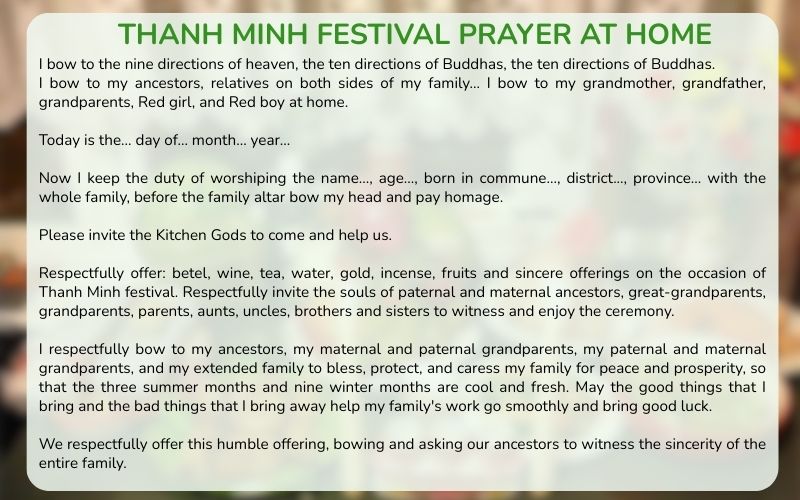
Things to Keep in Mind When Visiting Ancestors’ Graves during Qingming Festival
Tomb-sweeping is a deeply spiritual and traditional ceremony. Therefore, during Qingming Festival, visiting the graves of ancestors should be done correctly, showing respect and reverence. Here are some important things to remember:
- Dress neatly and modestly: When visiting the cemetery, choose polite clothing in neutral colors such as black, gray, brown, or dark blue. Avoid wearing bright, flashy, or inappropriate clothing to show respect and maintain a solemn atmosphere in the memorial space.
- Maintain a serious attitude, avoid joking around: Tomb-sweeping is a sacred ritual, not a picnic. Avoid loud laughter, running around, or engaging in any disrespectful behavior in the cemetery or around the graves.
- Do not step on others’ graves: While moving around the cemetery, be careful not to step on nearby graves. If bringing small children, remind them and guide them to avoid disturbing others’ resting places.
Avoid visiting after 3 PM: According to folk beliefs, it’s best to complete the tomb-sweeping before 3 PM to avoid disturbing the grave when dusk approaches. This is a time when it is believed there is increased “yin energy,” which is thought to be harmful to one’s health and spirit. - People in mourning or pregnant women should avoid tomb-sweeping: Some families observe this tradition to protect the energy of those visiting the grave and to minimize contact with the “yin energy” around the graveyard.
- Avoid taking photos in the cemetery: Taking commemorative photos, especially at the graves, is generally discouraged due to spiritual reasons and the need to show respect for the deceased.
- Do not make careless comments about others’ graves: Avoid pointing, commenting, or judging others’ graves. Such actions are considered disrespectful and may be seen as impolite within folk beliefs.
- Clean up after the ceremony: After the ritual, ensure that any trash is collected and that the area around the grave is tidied up to maintain cleanliness and demonstrate thoughtfulness and respect for the ancestors.
These guidelines are important to follow when visiting the graves of ancestors during Qingming Festival to ensure the ceremony is conducted with respect and reverence.
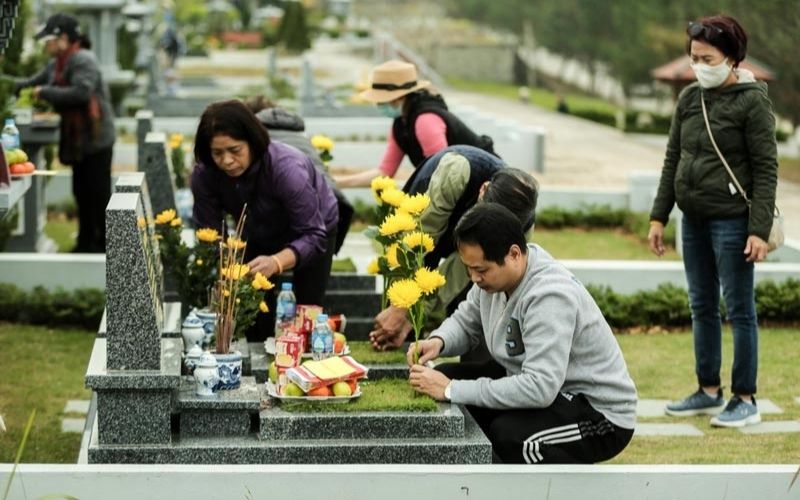
Beautiful Quotes About Qingming Festival in March
- “Qingming Festival is not just a time to visit graves, but a moment to pause and listen to the call from our roots.”
- “In the rush of life, Qingming Festival is like a deep, quiet note, reminding us of gratitude and family bonds.”
- “Tomb-sweeping on Qingming Day is not merely a ritual, but an act of nurturing memories and filial piety.”
- “As the earth transitions to Qingming, our hearts too become still – just enough to remember, to love, and to preserve tradition.”
- “Qingming Festival is a time to walk back to the past, not to mourn, but to appreciate the present and preserve the future.”
- “Every step taken in the cemetery on Qingming Day is a step back home – back to our family, back to our hearts.”
- “Qingming Festival is not just about remembering the deceased, but a time to mend the invisible gaps between generations.”
- “In the fragile incense smoke of Qingming, lies a sky full of memories and a sea of undying affection.”
- “On Qingming Day, descendants gather not just out of obligation, but because of family ties and the sacred word ‘remember’.”
- “Qingming Festival reminds us that life does not end with death, but continues through the love and gratitude of future generations.”
- 11. Excerpt from The Tale of Kiều by Nguyễn Du:
“In the Qingming season of the third month,
The ritual is tomb-sweeping, the festival is the ‘Treading on Green’.
Near and far, people eagerly gather for the feast,
Sisters prepare for the outing, dressing for the spring.
The scene is lively with scholars and young ladies,
Carriages like flowing water, clothes like a thick quilt.
The hills and mounds are cluttered with offerings,
Gold coins scattered, and joss paper ashes flying.
As the shadows slowly tilt to the west,
Sisters wander, hand in hand, heading home.
Gradually walking along the little creek,
Admiring the scenery, the peaceful atmosphere all around.”
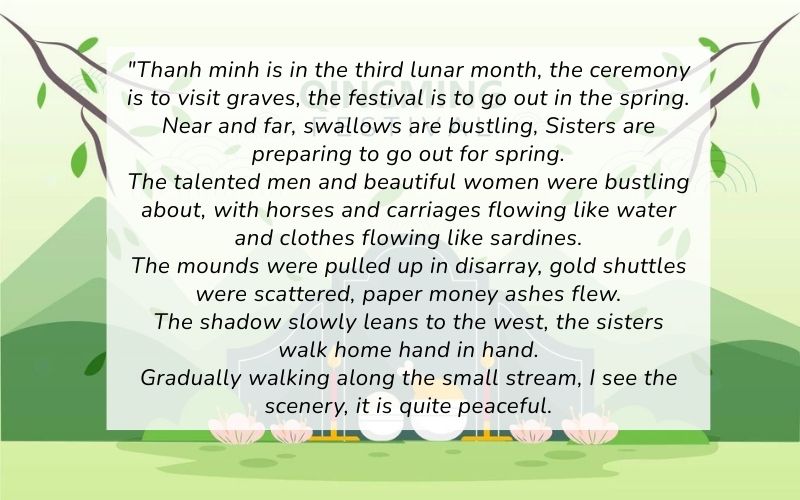
Frequently Asked Questions
Is Qingming Festival the same as Cold Food Festival?
Although Qingming Festival and Cold Food Festival are often close in date during the third month of the lunar calendar and both involve commemorating the deceased, the two festivals are entirely different in origin, meaning, and practices.
- Qingming Festival marks the first day of the Qingming solar term, typically falling between April 4 and April 21 in the Gregorian calendar, depending on the year.
- Cold Food Festival, on the other hand, is celebrated on the third day of the third lunar month each year. On this day, people refrain from cooking and typically offer cold food to their ancestors, such as sweet sticky rice cakes (bánh trôi) and vegetarian cakes (bánh chay).
When is Tomb-Sweeping Day in 2025?
In 2025, Tomb-Sweeping Day falls on Friday, April 4, 2025 in the Gregorian calendar, which corresponds to the 7th day of the 3rd lunar month. However, the tomb-sweeping ceremony can be performed flexibly between April 4 and April 19, 2025, which is the duration of the Qingming solar term.
Which day should we visit the tomb for Qingming Festival?
According to traditional customs, the best day for tomb-sweeping is the first day of the Qingming solar term, which in 2025 falls on April 4, 2025, corresponding to the 7th day of the 3rd lunar month. This is considered an ideal time, as the weather is pleasant and favorable for cleaning the graves and performing rituals to honor ancestors.
However, it is not mandatory to visit the tomb on April 4. Families can choose any day within the Qingming period from April 4 to April 19, 2025, as long as it falls within the Qingming solar term and is convenient for family reunions.
When is Qingming Festival in the lunar calendar in 2025?
The Qingming solar term in 2025 begins on April 4, 2025, in the Gregorian calendar, which corresponds to the 7th day of the 3rd lunar month. Since the Qingming solar term lasts around 15–16 days, tomb-sweeping can be done flexibly between March 7 and March 22 in the lunar calendar (or from April 4 to April 19 in the Gregorian calendar).
Conclusion
Qingming Festival is not only a deeply spiritual holiday but also a meaningful time for individuals to reconnect with their roots, express filial piety, and preserve family traditions. If you are interested in traditional cultural values, don’t forget to visit the Festivals section on our website to explore more insightful, meaningful, and informative articles about the various holidays throughout the year.
Xem thêm:



